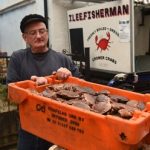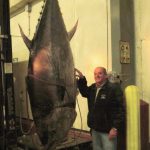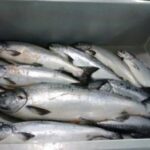Daily Archives: May 19, 2013
Police find 2 bodies near missing fishermen’s boat – 1 body recovered earlier near Tabusintac on Saturday
Two bodies have been found close to a submerged boat off the coast of New Brunswick, a day after a boat capsized with thre![]() e crew members on board. The body of one lobster fisherman was recovered on Saturday.continued
e crew members on board. The body of one lobster fisherman was recovered on Saturday.continued
Fisherman Darren Porter fears gate closures killing fish – “Once you see enough of it, it’s hard to watch.”
The Hants Journal – Darren Porter fishes in the Avon River for gaspereau five days a week in April and May. He first approached the Hants Journal with concerns that the gatekeeping practices at the causeway were causing large numbers of fish to die in May 2011.  Porter says smaller gate openings more often allow for the best possible fish passage into spawning grounds upstream, but that’s not what he’s been seeing this spring. “Once you see enough of it, it’s hard to watch.” continued
Porter says smaller gate openings more often allow for the best possible fish passage into spawning grounds upstream, but that’s not what he’s been seeing this spring. “Once you see enough of it, it’s hard to watch.” continued
Fisheries policy will destroy the industry it set out to protect – Preserving the Independence of the Inshore Fleet in Canada’s Atlantic Fisheries
 The plan was to prevent “corporations” from owning harvesting licences. Much to the surprise of the Department of Fisheries and Oceans and Canada Revenue Agency, most of the individual fishermen holding licences had already incorporated and took the revenue through a business while the licence was held by an individual. A blind eye here, a pen stroke there and the past was forgotten and the first concessions made — some corporations could hold licences. “One boat, one licence” is an idealistic perspective of fairness and independence. Fleet separation was to establish the rule that fishermen fish, and processors process. It is also one blurred by more concessions. continued
The plan was to prevent “corporations” from owning harvesting licences. Much to the surprise of the Department of Fisheries and Oceans and Canada Revenue Agency, most of the individual fishermen holding licences had already incorporated and took the revenue through a business while the licence was held by an individual. A blind eye here, a pen stroke there and the past was forgotten and the first concessions made — some corporations could hold licences. “One boat, one licence” is an idealistic perspective of fairness and independence. Fleet separation was to establish the rule that fishermen fish, and processors process. It is also one blurred by more concessions. continued
Another View: Bay Delta Conservation plan still evolving as more is learned – William Stelle Jr.,West Coast salmon coordinator , NMFS
sacbee.com – An April 25 Viewpoints article, “Twin tunnels water grab is doomed to fail,” noted a number of concerns with the Bay Delta Conservation Plan, citing the comments of the National Marine Fisheries Service on how to improve the current draft. The agency offers additional thoughts on the state’s plan for the Sacramento-San Joaquin Delta. continued
Letter to the Editor: Writer’s rhetoric offensive to fishermen – Russell A. Sherman, Captain, F/V Lady Jane, Gloucester
![]() I found the letter submitted by Mr. Smith of Manchester (the Times, Thursday, May 9) not only misinformed but offensive. Early on, Mr. Smith seems to tip his hand as an acolyte of the Conservation Law Foundation, quoting from the balderdash that this ersatz environmental group continually puts forth. continued
I found the letter submitted by Mr. Smith of Manchester (the Times, Thursday, May 9) not only misinformed but offensive. Early on, Mr. Smith seems to tip his hand as an acolyte of the Conservation Law Foundation, quoting from the balderdash that this ersatz environmental group continually puts forth. continued
Rhode Island Fishermen’s Alliance Weekly Update MAY 19, 2013
 “The Rhode Island Fishermen’s Alliance is dedicated to its mission of continuing to help create sustainable fisheries without putting licensed fishermen out of business.” Read the Update
“The Rhode Island Fishermen’s Alliance is dedicated to its mission of continuing to help create sustainable fisheries without putting licensed fishermen out of business.” Read the Update
Congressional delegation battles to save Apalachicola Bay
News Service of Florida – This week, the U.S. Senate was the scene of the latest skirmish in a tri-state water dispute between Florida, Georgia and Alabama dating back to 1990. The Senate voted 83-14 to pass the 2013 Water Resources Development Act, after deleting a provision backed by Florida Sens. Bill Nelson and Marco Rubio that would have required Georgia to use less water from federal reservoirs for metro Atlanta’s drinking supply and release more to the other two states. Now the fight shifts to the U.S. House, as the seafood industry in Franklin County struggles to regroup after years of drought. continued
In case you missed it, Farmed Salmon Escaped and are on the run in Newfoundland!
Department of Fisheries and Oceans Canada officials confirmed this week that farmed salmon escaped from an aquaculture site in the Fortune Bay area, and have turned up in the Garnish River. We told them it was going to happen,  they told us that we shouldn’t fear about it, but there is no signs to say that we shouldn’t fear,” Hutchens said. “In fact, what we do know is everywhere there’s been a finfish farm agricultural site, wild Atlantic salmon populations have drastically declined,” continued
they told us that we shouldn’t fear about it, but there is no signs to say that we shouldn’t fear,” Hutchens said. “In fact, what we do know is everywhere there’s been a finfish farm agricultural site, wild Atlantic salmon populations have drastically declined,” continued
Penning some revisionist history about Kenai King Salmon
 Let us all hope that the scholarship of Emilie Springer, in her doctoral studies of the culture and policy of state fisheries, is better than her research into the history of Kenai River salmon, because the woman posing behind the imprimatur of the National Science Foundation has a seriously flawed perspective on how that river came to be one of the most carefully monitored streams in the state. continued
Let us all hope that the scholarship of Emilie Springer, in her doctoral studies of the culture and policy of state fisheries, is better than her research into the history of Kenai River salmon, because the woman posing behind the imprimatur of the National Science Foundation has a seriously flawed perspective on how that river came to be one of the most carefully monitored streams in the state. continued
Snakeheads break out of Potomac, enter Rappahannock River
 Richmond Times-Dispatch – The northern snakehead, an invasive species of fish native to Asia, has successfully broken out of the Potomac River system and established itself in the Rappahannock River, according to state officials. The fish drew headlines when it turned up in a Maryland pond in 2002, in part because of its prodigious teeth and ability to survive several days out of water by breathing air. Spotted less than a decade ago in the Potomac, the snakehead has not just survived, but spread. continued
Richmond Times-Dispatch – The northern snakehead, an invasive species of fish native to Asia, has successfully broken out of the Potomac River system and established itself in the Rappahannock River, according to state officials. The fish drew headlines when it turned up in a Maryland pond in 2002, in part because of its prodigious teeth and ability to survive several days out of water by breathing air. Spotted less than a decade ago in the Potomac, the snakehead has not just survived, but spread. continued
Great Lakes Commercial fishing decline hits economies, communities
 LANSING – As the number of active state-licensed commercial fishing operations dwindles on the Great Lakes, their downward spiral signals a change in culture as well as economics and environment, according to Laurie Sommers, a folklorist and historic preservation consultant. continued
LANSING – As the number of active state-licensed commercial fishing operations dwindles on the Great Lakes, their downward spiral signals a change in culture as well as economics and environment, according to Laurie Sommers, a folklorist and historic preservation consultant. continued
Shoreline being searched for missing N.B. fishermen
 A search will resume today along New Brunswick`s northeast coast for two missing lobster fishermen. The body of a 23-year-old man from Tracadie-Sheila was later found near where the boat ran into trouble off of Tabusintac. The RCMP say a 35-year-old man from Tabusintac and a 32-year-old man from Brantville are still missing. continued
A search will resume today along New Brunswick`s northeast coast for two missing lobster fishermen. The body of a 23-year-old man from Tracadie-Sheila was later found near where the boat ran into trouble off of Tabusintac. The RCMP say a 35-year-old man from Tabusintac and a 32-year-old man from Brantville are still missing. continued
Laine Welch: Fuel cell technology boosts long-distance fish shipping – Bristol Bay and the USA – Bionic crab shells
 A maritime milestone will be set this week as a container of 18 tons of fresh salmon from Chile is offloaded from a cargo ship in California after a month at sea — without being frozen. How, you ask. By using fuel cell technology in a new way. A fuel cell is an electrochemical device that converts hydrogen and oxygen into water, and in the process produces electricity. continued
A maritime milestone will be set this week as a container of 18 tons of fresh salmon from Chile is offloaded from a cargo ship in California after a month at sea — without being frozen. How, you ask. By using fuel cell technology in a new way. A fuel cell is an electrochemical device that converts hydrogen and oxygen into water, and in the process produces electricity. continued












































